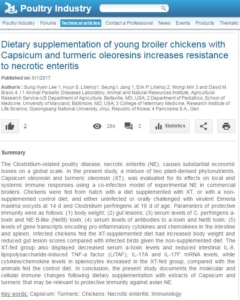Dietary supplementation of young broiler chickens with Capsicum and turmeric oleoresins increases resistance to necrotic enteritis
The Clostridiumrelated poultry disease, necrotic enteritis (NE), causes substantial economic losses on a global scale. In the present study, a mixture of two plantderived phytonutrients, Capsicum oleoresin and turmeric oleoresin (XT), was evaluated for its effects on local and systemic immune responses using a coinfection model of experimental NE in commercial broilers. Chickens were fed from hatch with a diet supplemented with XT, or with a nonsupplemented control diet, and either uninfected or orally challenged with virulent Eimeria maxima oocysts at 14 d and Clostridium perfringens at 18 d of age. Parameters of protective immunity were as follows: (1) body weight; (2) gut lesions; (3) serum levels of C. perfringens atoxin and NE Blike (NetB) toxin; (4) serum levels of antibodies to atoxin and NetB toxin; (5) levels of gene transcripts encoding proinflammatory cytokines and chemokines in the intestine and spleen. Infected chickens fed the XTsupplemented diet had increased body weight and reduced gut lesion scores compared with infected birds given the nonsupplemented diet. The XTfed group also displayed decreased serum atoxin levels and reduced intestinal IL8, lipopolysaccharideinduced TNFa factor (LITAF), IL17A and IL17F mRNA levels, while cytokine/chemokine levels in splenocytes increased in the XTfed group, compared with the animals fed the control diet. In conclusion, the present study documents the molecular and cellular immune changes following dietary supplementation with extracts of Capsicum and turmeric that may be relevant to protective immunity against avian NE



